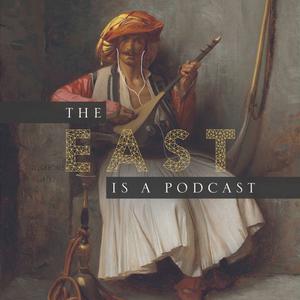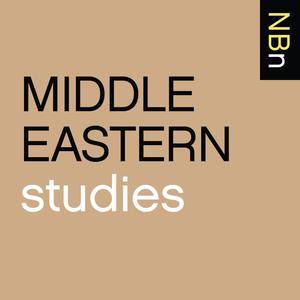
New Books in Islamic Studies
Interviews with Scholars of Islam about their New Books
- 43 minutes 38 secondsIn Conversation: The Far Right and Muslims
In this episode, Ismail Patel talks with Lars Erik Berntzen on the Far Right and the expansion of anti-Muslim sentiment within it.
Learn more about your ad choices. Visit megaphone.fm/adchoices
Support our show by becoming a premium member! https://newbooksnetwork.supportingcast.fm/islamic-studies
15 January 2025, 9:00 am - 39 minutes 56 secondsIn Conversation: Epistemology, Critical Race Theory and Critical Muslim Studies
In this episode, Uzma Jamil is speaking to Stephen Sheehi on epistemology, critical race theory and critical Muslim studies.
Learn more about your ad choices. Visit megaphone.fm/adchoices
Support our show by becoming a premium member! https://newbooksnetwork.supportingcast.fm/islamic-studies
8 January 2025, 9:00 am - 1 hour 36 minutesOishik Sircar, "Ways of Remembering: Law, Cinema and Collective Memory in the New India" (Cambridge UP, 2024)
Ways of Remembering: Law, Cinema and Collective Memory in the New India (Cambridge UP, 2024) tells a story about the relationship between secular law and religious violence by studying the memorialisation of the 2002 Gujarat pogrom--postcolonial India's most litigated and mediatized event of anti-Muslim mass violence. By reading judgments and films on the pogrom through a novel interpretive framework, the book argues that the shared narrative of law and cinema engenders ways of remembering the pogrom in which the rationality of secular law offers a resolution to the irrationality of religious violence. In the public's collective memory, the force of this rationality simultaneously condemns and normalises violence against Muslims while exonerating secular law from its role in enabling the pogrom, thus keeping the violent (legal) order against India's Muslim citizens intact. The book contends that in foregrounding law's aesthetic dimensions we see the discursive ways in which secular law organizes violence and presents itself as the panacea for that very violence.
About the Author: Oishik Sircar is a Senior Lecturer at the Melbourne Law School. He was previously the Professor of Law at Jindal Global Law School. His work maps the relationship between law, violence and aesthetics with a particular focus on contemporary India. Along with Ways of Remembering: Law, Cinema and Collective Violence in the New India (CUP 2024), he is the author of Violent Modernities: Cultural Lives of Law in the New India (OUP 2021) and the co-director of the award-winning documentary film We Are Foot Soldiers (PSBT 2010).
Priyam Sinha recently graduated with a PhD from the National University of Singapore and has been awarded the Alexander Von Humboldt Postdoctoral Fellowship, starting 2025. She has interdisciplinary academic interests that lie at the intersection of film studies, critical new media industry studies, disability studies, affect studies, gender studies, and cultural studies. She can be reached at https://twitter.com/PriyamSinha
Learn more about your ad choices. Visit megaphone.fm/adchoices
Support our show by becoming a premium member! https://newbooksnetwork.supportingcast.fm/islamic-studies
29 December 2024, 9:00 am - 1 hour 8 minutesPakistan, Populism and the Left
This podcast features Ammar Rashid, a leading figure in left-wing politics in Pakistan, and currently Director of the action-research organization Alliance for Urban Rights, and Research Lead at the public health think tank, Heartfile. This episode of Radio ReOrient is hosted by Sher Ali Tareen with Shehla Khan and Salman Sayyid. The conversation explores the lengthening political crisis in Pakistan by foregrounding the potential for resistance. In this vein, it ranges across several salient themes, notably the genealogy of prevalent political divisions, the current state of the Left, the prospects of coalition building, the nexus between Islamophobia and support for junta rule, and the contested notion of populism.
Learn more about your ad choices. Visit megaphone.fm/adchoices
Support our show by becoming a premium member! https://newbooksnetwork.supportingcast.fm/islamic-studies
27 December 2024, 9:00 am - 54 minutes 36 secondsIn Conversation: Enslaved Muslims in the Americas
A conversation with Dr. Sylviane Diouf on enslaved Muslim in the Americas. Diouf is the author of Slavery's Exiles: The Story of the American Maroons (NYU Press, 2016).
Learn more about your ad choices. Visit megaphone.fm/adchoices
Support our show by becoming a premium member! https://newbooksnetwork.supportingcast.fm/islamic-studies
25 December 2024, 9:00 am - 54 minutes 55 secondsDaniel Joseph Majchrowicz, "The World in Words: Travel Writing and the Global Imagination in Muslim South Asia" (Cambridge UP, 2023)
This episode features Daniel Majchrowicz, Associate Professor of South Asian Literature & Culture at Northwestern University, discussing his new book, The World in Words: Travel Writing and the Global Imagination in Muslim South Asia published in 2023 by Cambridge University Press. It is a study of South Asia’s global imagination as it was expressed in Urdu-language travel writing from 1840 to the present. The book argues that travel writing in South Asia was a broadly ecumenical genre that let Indian travelers not just describe the world as they found it, but to imagine it as they wished for it to be.
Opening this vast South Asian travel atlas, The World in Words introduces a new literary genre, unlocks new forms of literary subjectivity from long-ignored voices, and reveals new modes of circulation, mobility, and connection between India, Asia, and Africa, while also revealing how class, language, gender, race and power formed in colonial and post-colonial South Asia. While this is an academic book that could be used in South Asian studies courses and Islamic Studies courses, it also reads in part like a travelogue as Majchrowicz shares his own journeys discovering texts, libraries, and splendid private collections, sometimes with unexpected but fruitful leads. This text helps to decenter Western colonial travleogues and narratives, and allows for South Asian writers from Khanums' to princes' voices to be heard and studied, while also tracing the development of Urdu as a dominant regional language.
Learn more about your ad choices. Visit megaphone.fm/adchoices
Support our show by becoming a premium member! https://newbooksnetwork.supportingcast.fm/islamic-studies
20 December 2024, 9:00 am - 43 minutes 25 secondsIn Conversation: Critical Race Theory and Black Lives Matter
In this episode, Dr. Hizer Mir speaks with Momodou Taal on Critical Race Theory and Black Lives Matter.
Learn more about your ad choices. Visit megaphone.fm/adchoices
Support our show by becoming a premium member! https://newbooksnetwork.supportingcast.fm/islamic-studies
18 December 2024, 9:00 am - 1 hour 6 minutesAnne K. Bang, "Zanzibari Muslim Moderns: Islamic Paths to Progress in the Interwar Period" (Oxford UP, 2024)
Zanzibari Muslim Moderns: Islamic Paths to Progress in the Interwar Period (Oxford UP, 2024) is a historical study of Zanzibar during the interwar years. This was a period marked by rapid intellectual and social change in the Muslim world, when ideas of Islamic progress and development were hotly debated. How did this process play out in Zanzibar?
Based on a wide range of sources—Islamic and colonial, private and public—Anne K. Bang examines how these concepts were received and promoted on the island, arguing that a new ideal emerged in its intellectual arena: the Muslim modern. Tracing the influences that shaped the outlook of this new figure, Bang draws lines to Islamic modernists in the Middle East, to local Sufi teachings, and to the recently founded state of Saudi Arabia. She presents the activities of the Muslim modern in the colonial employment system, as a contributor to international debates, as an activist in the community, and more. She also explores the formation of numerous faith-based associations during this period, as well as the views of the Muslim modern on everything from funerary practices and Mawlid celebrations to reading habits. A recurring theme throughout is the question with which many Muslim moderns were confronted: who should implement development? And for whom?
Anne K. Bang is Professor of African Islamic History at the University of Bergen. She has published widely on Islamic intellectual exchanges in the Indian Ocean, and particularly on East Africa. She has also led several projects to bring the scriptural sources of this history to wider attention.
Ahmed Y. AlMaazmi is an Emirati historian who focuses on the intersection of occultism and imperialism in the Indian Ocean world. After completing his studies in cultural anthropology at Rutgers University as a Fulbright fellow, he pursued a PhD in Near Eastern Studies at Princeton University. His dissertation, An Enchanted Sea: Occultism and Imperialism in the Early Modern Indian Ocean World, 1450-1750, examines the connected histories of occult sciences and empire-building across Arabia, East Africa, and South Asia, told through intellectual projects that accompanied the rise of the Omani Yaʿrubī Empire and its diasporic communities. His recent work includes the article, “I Authored This Book in the Absence of My Slave: Enslaved East Africans and the Production of Occult Knowledge across the Omani Empire,” published in Monsoon Journal.
Learn more about your ad choices. Visit megaphone.fm/adchoices
Support our show by becoming a premium member! https://newbooksnetwork.supportingcast.fm/islamic-studies
18 December 2024, 9:00 am - 51 minutes 3 secondsLeyla Ozgur Alhassen, "Qur'ānic Stories: God, Revelation, and the Audience" (Edinburgh UP, 2022)
Leyla Ozgur Alhassen’s book Qur’anic Stories: God, Revelation and the Audience (Edinburgh University Press, 2021) provides excellent analyses of several Qur’anic surahs, or chapters, to explore how Qur’anic stories function as narratives – but not just any kind of narratives: narratives with a theological purpose behind them.
The specific stories she looks at include those of Maryam, Yusuf, and Musa primarily. Alhassen analyzes the literary themes present in these different chapters, such as the themes of control, knowledge, semantic echoes, and consonance, or themes of family, judgment, evidence, and secrets – whether it’s secrets that the text is withholding from the reader or secrets that characters are keeping from each other. One of the most important contributions that the book makes is to offer one possible and convincing explanation for why stories of the same characters are told in different ways in different chapters of the Qur’an. For example, God is woven into some stories as both a character and an omniscient narrator depending on the larger theme of the surah and the placing of the story; in some instances, God as the omniscient narrator shows the words of a beloved, righteous character as true, thus making a theological statement. Alhassen argues that in such renderings of a story, where it becomes unclear whether a certain quote is God’s or a character’s, the point the text is making there is that God merges His (or Her) words with characters as a reward from God. Other theological statements that the stories seem to be making are that they reveal some insight into divine intent.
In this interview, we discuss the origins of the book, how the Qur’an establishes structure and how Qur’anic stories serve as narratives, the main points of each chapter and story, and whether, and how, if at all, it matters that the Qur’an doesn’t give us identical quotes from characters in the various renditions of their stories in order to make an important stylistic choice.
Learn more about your ad choices. Visit megaphone.fm/adchoices
Support our show by becoming a premium member! https://newbooksnetwork.supportingcast.fm/islamic-studies
16 December 2024, 9:00 am - 1 hour 24 minutesShehnaz Haqqani, "Feminism, Tradition and Change in Contemporary Islam: Negotiating Islamic Law and Gender" (Oneworld, 2024)
Shehnaz Haqqani's new book Feminism, Tradition and Change in Contemporary Islam: Negotiating Islamic Law and Gender (Oneworld 2024), masterfully blends textual analysis of pre-modern and modern Islamic consensus with qualitative interviews with Muslims in the contemporary United States, to track how notions of what constitutes Islamic and Islamic tradition shift over time. We learn from her interlocutors that certain Islamic legal rulings can be negotiated, as in the case of child marriage, sexual slavery or even female inheritance, while other legal consensus, such as around women’s interfaith marriage or women leading mixed-gender prayers are not negotiable. Haqqani incisively swifts through these various standards of negotiations and arrives at how legal rulings pertaining to Muslim women’s experiences are met with resistance. It seems then that matters of urgency and relevance, which are inevitably political, dedicate when Islamic law and/or tradition can be negotiated. Haqqani’s book illuminates how Islamic tradition has always been flexible, but male dominated scholarly consensus still dedicates this flexibility (or rather inflexibility from an Islamic feminist perspective). This book will be of interest to those who think on gender, Islam, Islamic feminism, Islamic law, and much more.
Dr. Shehnaz Haqqani is an assistant professor at Mercer University and specialises in Islam, with a focus on gender and sexuality. She is a host of the podcast New Books Network.
Learn more about your ad choices. Visit megaphone.fm/adchoices
Support our show by becoming a premium member! https://newbooksnetwork.supportingcast.fm/islamic-studies
13 December 2024, 9:00 am - 42 minutes 36 secondsIn Conversation: Palestine and Decoloniality
In this episode, Dr. Ismail Patel talks with Prof. Hatem Bazian about structural Islamophobia, global politics and the demonisation of the Muslim.
Learn more about your ad choices. Visit megaphone.fm/adchoices
Support our show by becoming a premium member! https://newbooksnetwork.supportingcast.fm/islamic-studies
11 December 2024, 9:00 am - More Episodes? Get the App
Your feedback is valuable to us. Should you encounter any bugs, glitches, lack of functionality or other problems, please email us on [email protected] or join Moon.FM Telegram Group where you can talk directly to the dev team who are happy to answer any queries.
 The East is a Podcast
The East is a Podcast
 The Thinking Muslim
The Thinking Muslim
 Empire
Empire
 History Extra podcast
History Extra podcast
 New Books in Middle Eastern Studies
New Books in Middle Eastern Studies
 New Books in Critical Theory
New Books in Critical Theory